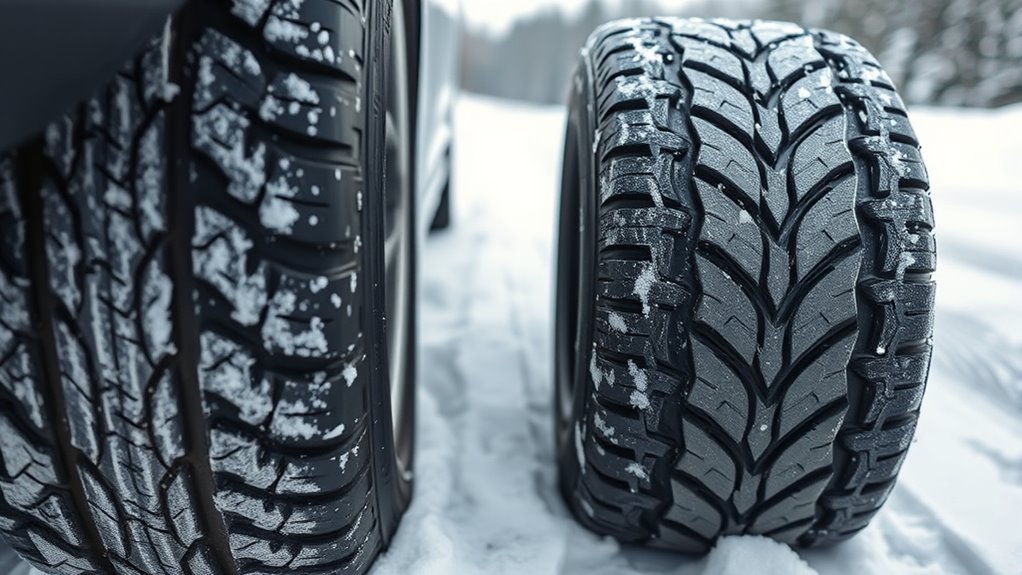If you face harsh winter conditions like snow and ice, winter tires are your best choice because they provide better grip and safety than all-season tires, which can harden in cold weather and lose traction. All-season tires may work if your winter is mild, but they don’t offer the same performance in severe snow or ice. To find out more about choosing the right tires for your climate, keep exploring your options.
Key Takeaways
- Winter tires offer superior grip and safety on snow and ice compared to all-season tires.
- All-season tires may be sufficient in mild winter climates but are less effective in severe winter conditions.
- Using winter tires in harsh winters improves driving safety and performance significantly.
- Winter tires wear faster if used year-round, especially on warm or dry roads.
- For optimal safety and performance in cold, icy environments, snow tires are highly recommended.

Are winter tires really worth the switch, or can all-season tires handle cold weather just fine? If you’re debating whether to swap your all-season tires for winter tires, it’s crucial to take into account how each impacts your driving experience. Winter tires are designed specifically for cold temperatures, and their unique rubber compounds maintain flexibility even when temperatures plummet. This flexibility helps them grip icy and snowy roads better than all-season tires, which tend to harden in low temperatures, reducing traction. While all-season tires are versatile and can handle mild winter conditions, they often compromise tire durability and fuel efficiency during harsher weather. Winter tires, made with softer rubber compounds, tend to wear faster if used year-round, but during winter, they maintain their integrity and performance, providing you with greater safety.
Winter tires improve grip and safety in cold, icy conditions compared to all-season tires.
When it comes to tire durability, winter tires excel in their intended season but may wear more quickly if used in warmer months. Their softer rubber and specialized tread patterns are optimized for snow and ice, but these features can lead to quicker degradation on dry or warm roads. Conversely, all-season tires are built to last longer across varied conditions, but their durability diminishes in extreme cold, where their tread design and rubber compounds don’t grip as effectively. If you live in an area with severe winter weather, investing in winter tires ensures you won’t be sacrificing safety or performance, even if it means replacing them more often. On the other hand, if your winters are mild, sticking with all-season tires might save you some money and effort.
Fuel efficiency is another critical factor. Winter tires tend to have higher rolling resistance due to their softer rubber and aggressive tread patterns, which can result in slightly reduced fuel efficiency. This means you might notice a small uptick in fuel consumption during winter months when you’re using winter tires. All-season tires, designed for a balance of grip and low rolling resistance, generally offer better fuel economy year-round. However, their performance drops in cold weather, which can lead to increased fuel consumption if your vehicle struggles for traction or if you’re driving more cautiously. If fuel efficiency is a top priority and your winters are mild, all-season tires could be the better choice. But if safety and grip in winter conditions outweigh the slight dip in fuel efficiency, then switching to winter tires makes more sense.
In the end, your decision should weigh the climate you face, your driving habits, and how much you value tire durability and fuel efficiency. For harsh winters with snow and ice, winter tires are a smart investment. For milder climates, all-season tires might suffice. Just remember, the right tires can make a significant difference in safety and performance during winter months.
Frequently Asked Questions
How Much Do Winter Tires Typically Cost Compared to All-Season Tires?
The cost comparison between winter tires and all-season tires varies depending on brand, size, and quality. Generally, winter tires tend to be more expensive upfront, often ranging from $80 to $150 per tire, while all-season tires usually cost between $60 and $120 each. Price variability exists, so shopping around can help you find good deals. Keep in mind, investing in quality winter tires can improve safety during harsh conditions.
Can All-Season Tires Perform Well in Extremely Cold Temperatures?
You might wonder if all-season tires handle cold performance well. In extremely cold temperatures, their tire traction can diminish because rubber hardens, reducing grip. While they perform adequately in mild winter conditions, they often lack the specialized tread patterns and rubber compounds needed for *crucial* cold performance. For safer driving in severe winter weather, investing in winter tires ensures better tire traction and reliability when temperatures drop *considerably*.
How Long Do Winter Tires Usually Last Before Needing Replacement?
Ever notice how your winter tires seem to wear faster when you hit the cold, icy mornings? Typically, they last about 3 to 6 seasons, but regular tire rotation and checking tread depth can extend their life. Keep an eye on the tread; once it’s worn down to 2/32 inch, it’s time to replace. Proper maintenance guarantees you stay safe and get the most out of your winter tires.
Are There Legal Requirements for Winter Tires in Certain Regions?
You should verify regional regulations because legal mandates for winter tires vary by area. In some regions, laws require you to have winter tires during certain months or when driving in snow-prone areas. Failing to comply can lead to fines or penalties. Always stay informed about your local laws to ensure you’re driving safely and legally, especially if you live in places with harsh winter conditions.
Do Winter Tires Damage Roads or the Environment More Than All-Season Tires?
Imagine your tires as tiny custodians of the road, working tirelessly every day. Winter tires, with their softer rubber, do cause slightly more road wear and have a bigger environmental impact than all-season tires. However, this impact is minimal compared to the safety they provide in snow and ice. Your choice affects not just your drive but also the road’s health and the environment’s well-being.
Conclusion
In the end, choosing between winter and all-season tires boils down to safety and peace of mind. If you live in areas with heavy snow and ice, investing in snow tires is like having a safety net—trust it to catch you when conditions get tough. Remember, “A stitch in time saves nine,” so don’t wait until trouble strikes. Prioritize your safety now, and you’ll glide smoothly through winter’s worst.





